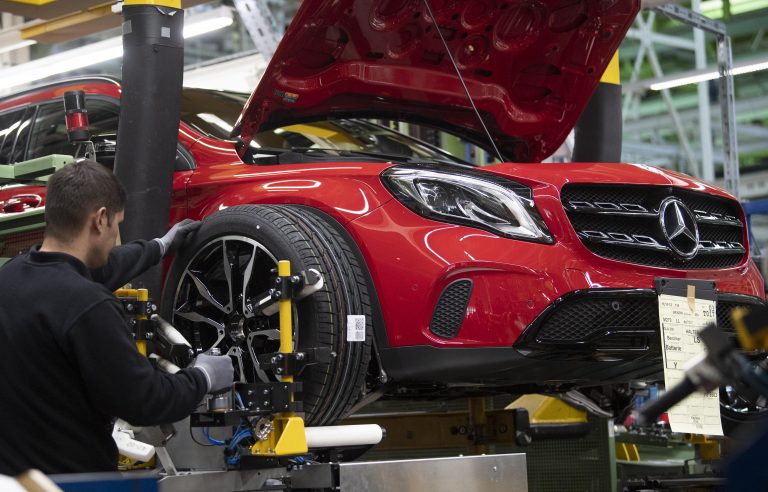Stuttgart-based auto giant Daimler announced on Nov. 20 plans to begin joint production of hundreds of thousands of next-generation combustion engines for use in hybrid auto technology with Chinese car manufacturer Geely Holdings.
Daimler, one of the world’s largest and oldest vehicle manufacturers, holds the elite Mercedes-Benz as its sole passenger offering and also boasts itself as the largest manufacturer of commercial vehicles in the world with the Mercedes-Benz line of trucks and vans, as well as the Freightliner and Western Star semi-truck brands.
China’s Geely Holdings, headquartered in Hangzhou, Zhejiang, not only manufacturers under the Geely brand in China, but also bought Volvo from Ford in 2010, acquired British taxi company London Electric Vehicle Company in 2013, and has a majority stake in elite sports car brand Lotus as of 2017.
According to information from industry and Daimler group circles, the German giant is additionally planning a major alliance with Geely, reports the Handelsblatt newspaper about the secret project Horus. Starting in 2024, the two companies plan to jointly produce hundreds of thousands of gasoline engines annually — presumably in China.
Daimler alluded to these plans in its November 20 press release: “We are looking forward to the future; when, together with Volvo’s ICE unit and Geely, we will further extend our synergies in the field of highly efficient drivetrain systems in China and the world.”
‘No talks’ despite ability to build in Germany
Success
You are now signed up for our newsletter
Success
Check your email to complete sign up
However, the plans do not sit well with Daimler’s Works Council and its employees at the Untertuerkheim Factory. “We are speechless. There was not even a discussion about potential alternative manufacturing locations,” said Michael Häberle, Works Council Chief to Reuters.
“We have the ability to build four cylinder engines in Untertuerkheim but there were no talks about it.”

Despite the concerns raised by the Council and its workers, Daimler’s Board of Directors appears to be very pleased. “This is a new and very good partner,” said Daimler CEO Ola Källenius at the Handelsblatt Automotive Summit on November 6.
Källenius praised Daimler’s largest single shareholder, Li Shufu, who also serves as Chairman of both Geely Holdings and Volvo. “With Geely founder Li Shufu, we have a second shareholder from China who thinks very visionarily and progressively, and who also sees the automotive future in Daimler.”
Li is also a member of the National Committee of the Chinese Communist Party’s Chinese People’s Political Consultative Conference.
The Conference is a major CCP organization that serves as a controlling mechanism for the totalitarian Party over the Chinese public.
A Daimler spokesman told Handelsblatt, which is a German business-oriented daily: “The companies are planning to develop a highly efficient modular engine that will enable next-generation hybrid vehicle applications manufactured in Europe and China.”
The engines will be installed in both Daimler and Volvo vehicles.
Hundred of millions in savings
Citing Daimler sources, Handelsblatt believes that Daimler wants to take advantage of Geely’s more cost-effective production conditions in China to achieve annual cost savings in the “triple-digit million sum” range.
According to Daimler’s Shareholder Structure website, Chinese state-owned company BAIC (Beijing Automotive Industry Holding Co.) holds 5 percent of Daimler’s shares, while Li Shufu personally holds the largest equity stake in Daimler at 9.7 percent through his shell company, Tenaciou3 Prospect Investment Limited, which is incorporated in Hong Kong.
As to how China’s Li gained such an enormous position in German Daimler, according to a 2018 Reuters article: “Daimler rejected a proposal by Geely to acquire a stake or reach a technology-sharing deal. The next month, Tenaciou3 signed agreements, subsequently filed with Hong Kong’s companies registry, with Morgan Stanley and Bank of America Merrill Lynch that would help the Chinese company build its stake in a less-direct way.”
The article continues: “The result was a $9 billion investment that skirted disclosure rules requiring investors to notify German authorities if their share of voting rights in a company passed 3 percent, and then 5 percent. Because of the way the stake was built, there is no indication that Geely breached those rules.”
A senior Daimler executive told Reuters under the condition of anonymity: “The fact that Li would invest did not come as a surprise… But how he went about it certainly was.”














